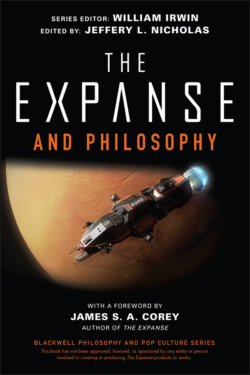Читать книгу The Expanse and Philosophy - Группа авторов - Страница 11
Оглавление
Foreword
Science fiction, like philosophy, is an act of critical imagination.
The heart of philosophy is how to think meaningfully about issues that defy measurement. Great questions of philosophy—what is the universe made from, how does the natural world function, what is life and how did it begin—give way over time to science as measurement and data collection provide evidence, answers, and definition. The elements are revealed not to be earth, air, fire, and water, but atoms and the things that make up atoms. The origin of life becomes a question of chemistry producing amino acids and evolution selecting for stable replicating structures. Philosophy moves forward into the realms where data and its interpretation don’t yet exist.
Science fiction is also a way to think about what we don’t yet know, but can imagine. Over time, even the most rigorously meant speculations of science fiction are shown to be inaccurate or else proven true and cease to be speculative. What was once Science Fiction becomes Fantasy, and the next generation of writers and artists, actors and game designers move on to places where the truth isn’t yet established.
And so, slowly, between the imagination of the artists and philosophers, and the discoveries of the scientists and engineers, the universe becomes better understood, the breadth of human knowledge is increased, and nature of culture is changed.
The Expanse is at its heart a collaborative project. As a series of novels, it began with two of us. As television show, it grew to include the efforts of literally hundreds of talented, engaged artists with specialties in set design, visual effects, acting, sound and lighting design, editing, and dozens more.
It also grew as an instance of popular culture through the efforts of fans and critics, marketing departments and online Lang Belta teachers, and the shared enthusiasm of people who came to the project and then brought other people in.
But it also began with the books that we read when we were growing up—Alfred Bester, Larry Niven, Arthur C. Clarke, C. J. Cherryh, Harry Harrison. And with the historical figures and events back to pre‐classical times that we used as models for the events we imagined in our collective future. The taxonomy of what The Expanse is—where it begins, where it ends, what its boundaries are—is, like so many taxonomies, only clear at a distance. The border becomes much less defined as it is examined more closely.
And just as history—both the documented acts of real people and the literary and genre conversations that came before us—gave us a lens to make sense of our project, The Expanse is going on to provide a lens for other people to engage with their own stories, their own analyses, and their own contributions to the ever‐wider acts of cultural and intellectual creation.
This is not a book we wrote, but one we helped to inspire. In it, you will find arguments, observations, and opinions on a wide variety of philosophical subjects with The Expanse acting as a kind of touchstone for the conversation. It is gratifying in a way that’s hard to put in words to see the conversation we took from the generations before us carry through beyond the work we’ve done. It will challenge you, reframe some of your ideas, and—hopefully—leave you a little more awed, a little wiser, and a step or two further along your own intellectual journey.
Because philosophy, like science fiction, is an act of critical imagination.
James S. A. Corey
